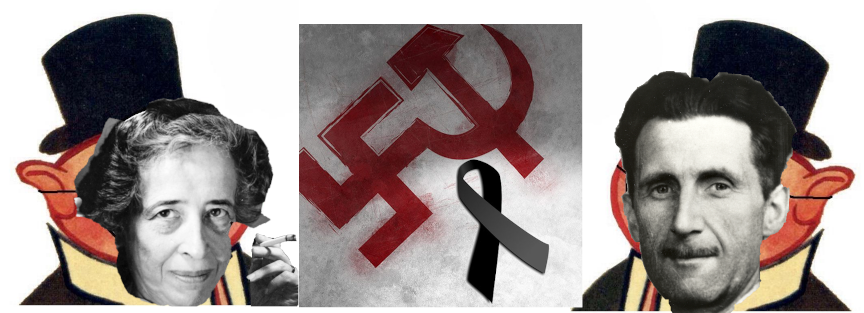Dylan Moroch, Baile Átha Cliath.
“Totalitarianism” has been used by capitalist and imperialist nations to vilify and condemn anything other than the United States and their ‘freedom loving’ allies; however, something interesting is at play here, that of the implications of what totalitarianism actually is and what those of any political position to the right of a socialist would like to forget in their analysis of the concept.
If we understand totalitarianism as the state’s desire to control all aspects of individual life and to wield absolute power, then calling Nazi Germany, Fascist Italy, and Falangist Spain a totalitarian regime is altogether an uncontroversial point. Yet when this descriptor is applied to socialist states something does not sit well. This discrepancy is twofold: firstly it is a tool of the imperialist nations to distance themselves from their Second World War, and later Cold War, rivals – keeping in mind that the United States’ institutional slavery of African-Americans influenced heavily Hitler’s Reich – and secondly an attempt to throw their greatest enemy, communism, under the proverbial bus. Fascism is capitalism overgrown, and although eighty-year-old Nazi propaganda argues otherwise, no fascist movement has ever been socialist or represented genuine workers’ interests. Therefore, in one fell-swoop the United States, and others, absolve themselves of their brutal history all the while throwing every socialist project to the wolves.
What anyone who has not applied a Marxist analysis conflates is essentially left-wing versus right-wing totalitarianism, both of which have important pragmatic and ideological differences, and which exist as each other’s opposite. Right-wing totalitarianism is fascism, but left-wing totalitarianism is actually a misnomer; it is instead the dictatorship of the proletariat – i.e. a state in which the workers are in full control. This is what capitalists seek to vilify with the conflation of fascism and the dictatorship of the proletariat, and this is what scares them, that the majority of people could take their power from them. This misdirection between the dictatorship of the proletariat and right-wing totalitarianism essentially stems from the work of Hannah Arendt, most prolifically in The Origins of Totalitarianism, in which the coupling of Nazism and Soviet Socialism emerged to fit the United States’ burgeoning post-war imperialist policies. Not only does Arendt connect the Soviet Union with Nazi Germany but effectively creates a ‘good empire’ and ‘bad imperialism’ dichotomy which not only marks the United States as that ‘good empire’, and Soviet foreign policy as the ‘bad imperialism’, but also is incredibly racist. In the English version of The Origins of Totalitarianism she writes that, ‘…the savages of Africa…human beings living without the future of a purpose and the past of accomplishment’; whereas the German version of the text is worse yet, ‘[the peoples of Africa and Australia] have no culture whatsoever’. Why does this matter? Well, the entire purpose of equating Nazism with Socialism is to mark western imperialist nations as the ‘good guys’ – ironically enough – and to present them as the sole saviours. It is not evil which is banal, but Hannah Arendt herself.
By my own definition is the dictatorship of the proletariat totalitarian? Yes, but that altogether misses the point of what a transitionary society looks like and does not mean it is anywhere near what fascism is, and to claim so ultimately propagates capitalist propaganda. “Totalitarianism” is a bourgeois dog-whistle, and the philosophical complexity of class struggle is lost on them, as in most political spheres, but it should not be lost amongst us Marxists. Just as communists are vanguards of the revolution, so too must we be vanguards of the logic of revolution, and we must confront liberal propaganda in places where others simply cannot go by virtue of Marxist-Leninist analysis. The irony which underpins all of this is who wins the award for the modern totalitarian state; it is not China, or Vietnam, or Cuba, or any other vilified socialist project, but rather the United States itself. Just as Lenin points out in his lecture on the history of the state, these imperialist countries may be democracies, or republics, or monarchies but they are these things for the capitalists – for the slave-owners – and totalitarian for capital.


You should make a subscription for readers so we can be notified about when post good articles like this.as an ML in Britain I do enjoy reading articles from other ML’s which are hard to come by nowadays! Red salute comrades.